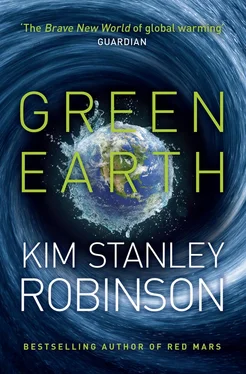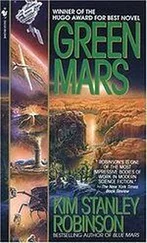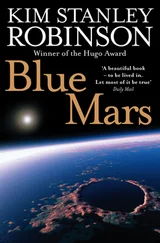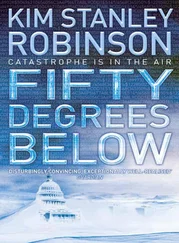These thoughts flitted through Frank’s mind as their elevator ride ended and he and Anna walked down the hall to their offices. Anna was as tall as he was, with a nice figure, but the dimorphism differentiating them was in their habits of mind and their scientific practice, and that might explain why he was a bit uncomfortable with her. Not that this was a full characterization of his attitude, but she did science in a way that he found annoying. It was not a matter of her being warm and fuzzy, as you might expect from the usual characterizations of feminine thought—on the contrary, Anna’s scientific work (she still often coauthored papers in statistics, despite her bureaucratic load) often displayed a finicky perfectionism that made her a very meticulous scientist, a first-rate statistician—smart, quick, competent in a range of fields and really excellent in more than one. As good a scientist as one could find for the rather odd job of running the Bioinformatics Division at NSF.
But she was so intense about it. A kind of Puritan of science, rational to an extreme. And yet of course that was all a front, as with the early Puritans; the hyperrational coexisted in her with all the emotional openness, intensity, and variability that was the American female interactional paradigm and social role. Every female scientist was therefore a kind of Mr. Spock, the rational side foregrounded and emphasized while the emotional side was denied.
On the other hand, judged on that basis, Frank had to admit that Anna seemed less split-natured than many women scientists he had known. Pretty well integrated, really. He had spent many hours of the past year working with her, engaged in interesting discussions, and he liked her. His discomfort came not from any of her irritating habits, not even the nitpicking or hairsplitting that made her so strikingly eponymous (though no one dared joke about that to her); no, it was more the way her hyperscientific attitude combined with her passionate female expressiveness to suggest a complete science, or even a complete humanity. It reminded Frank of himself!
Not of the self that he allowed others to see, of course, but rather of his internal life as he alone experienced it. He too was stuffed with extreme aspects of both rationality and emotionality. This was what made him uncomfortable: Anna was too much like him. She reminded him of things about himself he did not want to think about. But he was helpless to stop his trains of thought. That was one of his problems.
Halfway around the circumference of the sixth floor, they came to their offices. Frank’s was one of a number of cubicles carving up a larger space; Anna’s was a true office right across from his cubicle, a room of her own, with a foyer for her secretary, Aleesha. Both their spaces, and all the others in the maze of crannies and rooms, were filled with the computers, file cabinets, and crammed bookshelves that one found in scientific offices everywhere. The decor was standard beige for everything, indicating the purity of science.
In this case it was all rendered human, and even handsome, by the big windows on the interior sides of every room, allowing everyone to look across the central atrium and into all the other offices. This open space, and the sight of fifty to a hundred other humans, made each office a slice or echo of the savannah. The occupants were correspondingly more comfortable at the primate level. Frank did not suffer the illusion that anyone had consciously planned this effect, but he admired the architect’s instinctive grasp of what would get the best work out of the building’s occupants.
He sat down at his desk, gazed out across the atrium. He was near the end of his year-long stay at NSF, and the workload was becoming less and less important to him. Piles of articles lay in stacks on every horizontal surface, and his computer contained hundreds of proposals for his evaluation. He had a lot of work to do. Instead he looked out the window.
The colorful mobile filling the upper half of the atrium was a painfully simple thing, basic shapes in primary colors, very like a kindergartner’s scribble. Frank’s many activities included rock climbing, and often he had occupied his mind by imagining the moves he would need to climb the mobile. There were some hard sections, but it would make for a fun route.
Past the mobile, he could see into one hundred and eight other rooms (he had counted). In them people typed at screens, talked in couples or on the phone, read, or sat in seminar rooms looking at photos on screens, or talking. Mostly talking. If this place were all you had to go on, you would have to conclude that doing science consisted mostly of talking.
This was not even close to true, and it was one of the reasons Frank was bored. The real action of science took place in laboratories, or anywhere else experiments were being conducted. What happened here was different, a kind of meta-science, one might say, which coordinated scientific activities, or connected them to other human action, or funded them.
The smell of Anna’s latte wafted in from her office next door, and he could hear her on the phone already. She too did a lot of talking on the phone. “I don’t know, I have no idea what the other sample sizes are like … No, not statistically insignificant, that would mean the numbers were smaller than the margin of error. What you’re talking about is just statistically meaningless.”
Meanwhile Aleesha, her assistant, was on her phone as well, patiently explaining something in her rich D.C. contralto. Unraveling some misunderstanding. It was an obvious if seldom-acknowledged fact that much of NSF’s daily business got done by African-American women from the area, who often seemed decidedly unconvinced of the earth-shattering importance that their mostly Caucasian employers attributed to the work. Aleesha, for instance, displayed the most skeptical politeness Frank had ever heard.
Anna appeared in the doorway, tapping on the doorjamb as she always did, to pretend that his space was an office. “Frank, I forwarded that jacket to you, the one about an algorithm.”
“Let’s see if it arrived.” He checked, and up came a new one from aquibler@nsf.gov. He loved that address. “It’s here, I’ll take a look at it.”
“Thanks.” She hesitated. “When are you due to go back to UCSD?”
“End of July or end of August.”
“Well, I’ll be sorry to see you go. I know it’s nice out there, but we’d love it if you’d consider putting in a second year, or even think about staying permanently, if you like it. Of course you must have a lot of irons in the fire.”
“Yes,” Frank said noncommittally. Staying longer than his one-year stint was completely out of the question. “That’s nice of you to ask. I’ve enjoyed it, but I should probably get back home. I’ll think about it, though.”
“Thanks. It would be good to have you here.”
Much of the work at NSF was done by visiting scientists, who came on leave from their home institutions to run NSF programs in their area of expertise for periods of a year or two. The grant proposals came pouring in by the thousands, and program directors like Frank read them, sorted them, convened panels of outside experts, and ran the meetings in which these experts rated batches of proposals in particular fields. This was a major manifestation of the peer-review process, a process Frank thoroughly approved of—in principle. But a year of it was enough, actually far more than enough.
Anna, watching him, said, “I suppose it’s a bit of a rat race.”
“Well, no more than anywhere else. At home it’d probably be worse.”
They laughed.
“And you have your journal work too.”
“That’s right.” Frank waved at the piles of typescripts: three stacks for Review of Bioinformatics, two for The Journal of Sociobiology. “Always behind. Luckily the other editors are better at keeping up.”
Читать дальше












